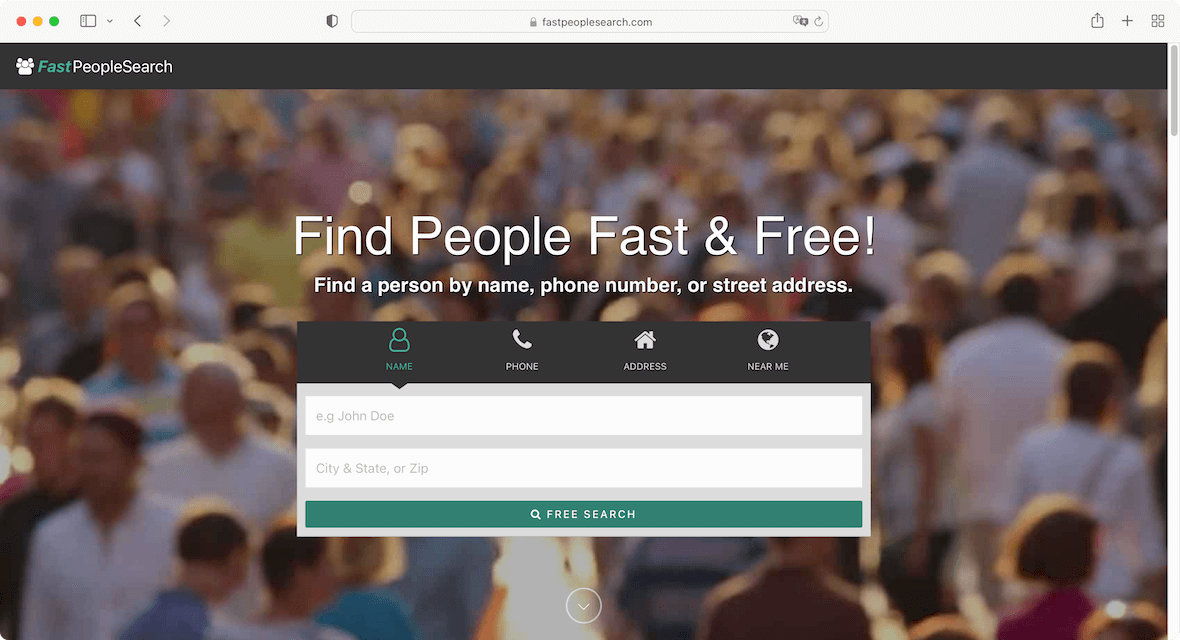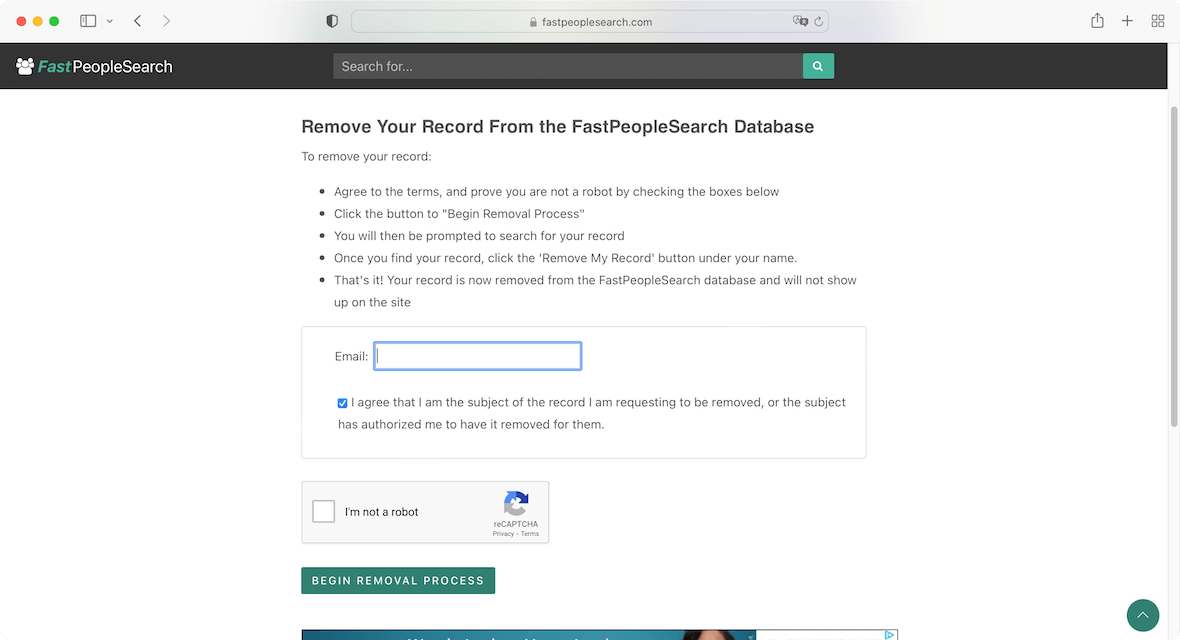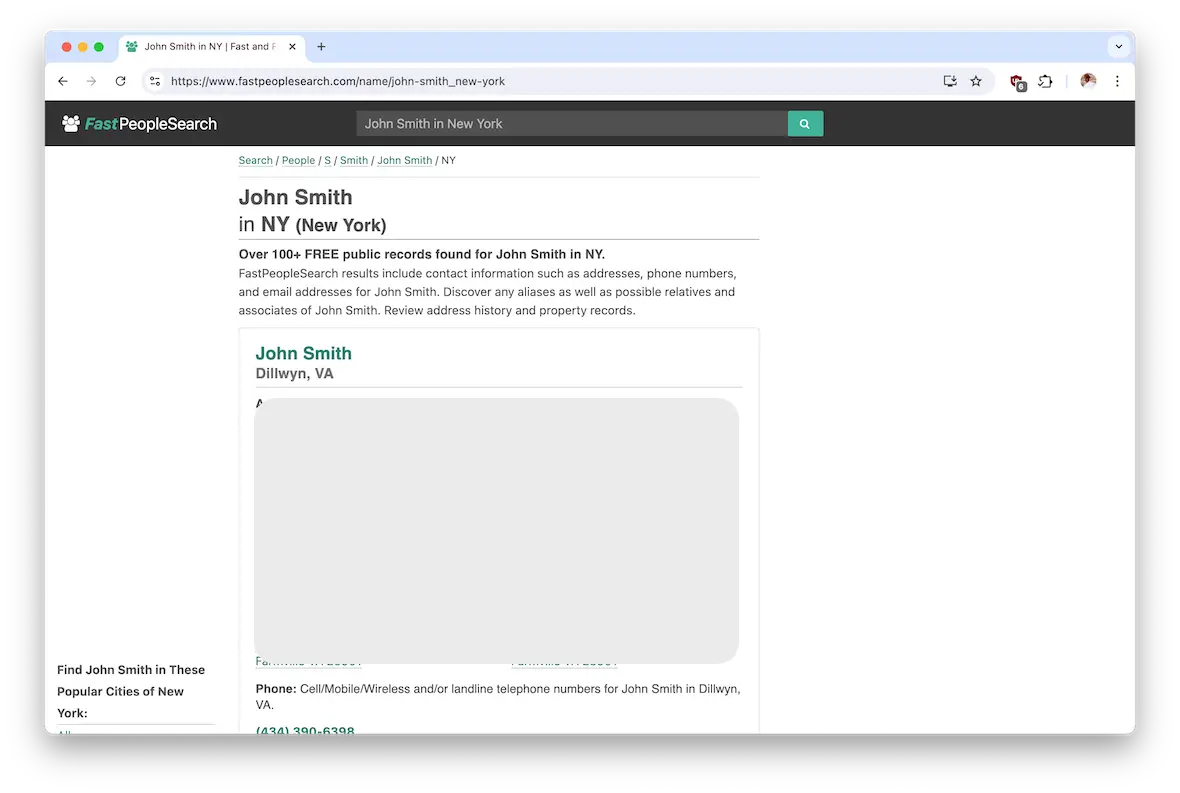You can find anything on the internet, but as well as being a huge advantage, that can also be a huge problem. No piece of personal information is safe. In fact, just about everything can be found if you get out your credit card and pay a few bucks to a people search engine, such as FastPeopleSearch.
Unless you want your life to be an open book for anyone with an internet connection and a Visa card, you need to get proactive and do a simple FastPeopleSearch removal. Get that information offline and back into the private domain where it belongs. You are legally entitled to demand that your information be removed. They may drag their heels, but they are still legally obligated to do it.
What is FastPeopleSearch?

FastPeopleSearch can provide you with all the information you need to find out about someone and their family members. The initial result is free and unearths the person’s age, address (past and present), names of relatives (with links to their information), email addresses, and phone numbers. That alone would be as good as gold for abusive spouses, stalkers, and criminals.
But if you think that an address, phone number, and email address are all they give out, think again. For a few dollars, you can also get a person’s entire life history, including marriage and divorce status, criminal records, court judgments, and a lot more. It’s everything you could possibly need to smear someone, reject their job application, or even take over their identity.
Is FastPeopleSearch legal?
The short answer is yes. FastPeopleSearch operates within the boundaries of the law. However, what a person or business subsequently does with the data they get from this site may not be legal.
Illegal activities like spamming, spear phishing, whaling, and other cybercriminal techniques use personal data that may be available on sites like FastPeopleSearch. Other activities, like employee background checks, may be legal but require consent. This means you cannot investigate a person’s personal history using FastPeopleSearch data without their previous agreement or consent. But unfortunately, many employers do not follow the laws of background checks and use the site to look into individuals’ data without their permission.
Finally, organizations and businesses must follow certain laws regarding data privacy and how financial data is used. Credit, insurance, banking, bond, and other reports cannot be compiled using FastPeopleSearch information, as there is the potential to produce biased and discriminatory results and breach important laws like the FCRA.
In conclusion, FastPeopleSearch is a legal site, but there’s no guarantee that the information gained from it will be used for legal purposes. Furthermore, having your data published online on sites like FastPeopleSearch may result in significant personal risk. Luckily, you can easily remove yourself and all your personal information.
Looking for ways to reduce your digital footprint?
How to remove your information from FastPeopleSearch
The good news is that if you are a US resident, opting out of FastPeopleSearch is relatively easy. In other words, you can remove your data, name, and entire profile from FastPeopleSearch by submitting a fast and simple opt-out request.
To remove yourself from FastPeopleSearch:
- Go to the FastPeople Search removal page.
- Enter your email.
- Check the boxes to agree to the terms and prove you are not a robot.
- Click Begin Removal Process.
- In the new window, search for your record by typing in your name and address.
- Once you have found your record, click on the name.
- Select Remove My Record.

Keep in mind that FastPeopleSearch isn’t the only people search engine in town. Sites like BeenVerified, Spokeo, or TruthFinder are also quite popular. If you want to remove your data from those sites, there are several options. For example, DeleteMe promises to remove your information from Google, multiple people search engine sites, and more than a hundred data brokers.
FastPeopleSearch removal requirements
The FastPeopleSearch removal process has some basic requirements. For example, only US residents can take advantage of the opt-out process. Also note that the site can only be accessed through a US VPN.
Full FastPeopleSearch removal requirements include:
- Opt-out timeframe: Up to 72 hours
- Estimated time for manual request submission: 15 minutes
- Requires an email address: Yes
- CAPTCHA solving: Yes
- Mandatory phone number: No
- Requires uploading an ID copy: No
- Requires a mail-in request with an ID copy: No
- US residents only: Yes
- US VPN: Yes
Are there any other ways to opt out of FastPeopleSearch?
The previous section describes the best way to remove data from FastPeopleSearch. The other way to do it is to simply contact them via their Contact Us page and make a request there. But it really is no different than doing a normal FastPeopleSearch removal request.
Their contact page has a snail mail address and phone number. If they are ignoring your emails and letters, a phone call to customer service may yield better results.
One smart tactic is to make their information useless. You could start by putting false information online (say, on social media). Give marketing companies the phone number of your local police precinct. Call your utility companies and give them a deliberate misspelling of your name. Give them a fake date of birth and a false place of birth. Misspell your relatives’ names. That information will eventually make its way onto FastPeopleSearch.
Why does FastPeopleSearch collect my information?
The first question that is likely to enter someone’s mind is why a service like FastPeopleSearch would collect this kind of information. Well, it all comes down to only one thing. Money.
Yes, cold hard cash is the oldest motive known to man. Information is power. Therefore, that information is valuable and profitable. There will always be someone out there wanting data on someone else to gain an advantage over them — data that they will gladly pay for.
It’s not just politicians who compile attack dossiers on opponents. Consider business partners (current and potential), jealous lovers, ex-romantic partners, suspicious spouses, lawyers wanting leverage on potential jurors, or nosy people who want to know about the new neighbor. The list goes on and on.
How accurate is FastPeopleSearch?
The information on FastPeopleSearch is only as accurate as the information it is able to collect. In other words, it can only collect what is out there to be found. If you take proactive steps to protect your information, it becomes more difficult for FastPeopleSearch to collect it.
It should also be noted that a user’s information can change frequently and, therefore, become out of date. People move to new addresses and change phone numbers. But how many times in the last year or two have you changed email addresses? Not only that, but when people die, their information becomes mostly useless.
As newer information on people becomes available, FastPeopleSearch will no doubt scoop it up as fast as possible and put a price tag on it. But until they do, some of the older information they have is likely to be a bit outdated. For this reason, they are likely to offer older information as a free sample.
Where does FastPeopleSearch get your information from?

FastPeopleSearch assures that it can find vital data to help users and businesses identify persons. The data on the site is not 100% accurate. The information on it has no legal standing to run consumer credit, employment, insurance, tenant screening, or any other reports that require Fair Credit Reporting Act (FCRA) compliance. However, the information is still heavily used. But where does the site get it from?
Crawling the web with bots
Every top search engine uses bots to index results, and FastPeopleSearch is no exception. Bots — coded programs — scan the web searching for specific data. Bots are a very common method to extract information from the internet.
Scanning social media
FastPeopleSearch also gathers information from social media accounts. Unless your social media account is set to Private mode, your information is public and available for anyone to see. This is a good reminder to always be careful what you publish on your social media accounts.
Government public records
From tax records to driver’s licenses and more, the government public record database system is as vast as it is abundant. And FastPeopleSearch engine makes use of it to build up its services.
Courts and law enforcement agencies
Encounters with the police, legal issues, and criminal records are all stored in public records. Most court and law enforcement information, except that which is sealed or classified, is available to the public, and FastPeopleSearch leverages it.
Property records and listings
Property records and listings are also public and can be accessed. So any asset of significant value registered in your name can appear on sites like FastPeopleSearch and be linked to your data.
Data brokers
Personal and private user data is a multi-billion dollar global business. Companies buy data for various reasons, from marketing to attracting and retaining customers. Not only that, but sites that collect data will often interact, trading databases or buying and selling them to the highest bidder. Additionally, there are several sites that you may have willingly signed up for without reading the terms of the agreement. They, too, may share your data with third parties.
Why isn’t my FastPeopleSearch removal request working?
Once you have submitted your removal request, it will take some time to process. But if you are waiting weeks or even months without any success, it’s time to start wondering why your FastPeopleSearch removal request isn’t working.
Here are a few possible reasons:
- It’s not in their best interests to move quickly. Your information is valuable, and they are making a profit from it. The faster that information is removed, the less money they are making on it.
- You gave inaccurate information on your removal request. It happens. If you accidentally gave the wrong address, the wrong date of birth, etc., then that will hold up the process. Check what you sent them.
- Public records stay public. You may not like having your birth, marriage, and civil court judgments online for everyone to see. The unfortunate truth, however, is that these records are considered to be public property and cannot be made private. You may be able to get a civil court judgment sealed, but you would need a judge to sign off on that.
- Deleted records will get re-added from another source. Sometimes, you have to ask yourself if it is really worth going through the trouble of a removal process. Even if you do manage to get your information off their database, it will eventually just get re-added again when the site buys the next lot of data from a broker. So, if your information is still there, it may have been deleted as per your request, only to immediately be put back again.
Why you should remove your personal information from FastPeopleSearch
You may be one of those people who simply shrug their shoulders and think, “So what if they have my address? I don’t care.” Well, you should care.
You have a right to privacy
The right to privacy may sound cute and even naïve in this highly interconnected day and age. Nevertheless, it still remains true. Your details should remain private if you want them to.
FastPeopleSearch will resell it elsewhere
Since this is a business set up for maximum profit, it is more than likely that your data will be sold to another similar company or a data broker. If you manage to remove your data from one site, you can perhaps reduce the chance of it getting passed to someone else. The chances are not high, but you should still make the effort.
The information can be used to impersonate You
Think about it. What does a con artist need to take out a loan under your name? Your full name, full address, previous addresses, and date of birth.
Guess what? They can get all of that information from FastPeopleSearch.
You’re opening the door to stalkers and abusive ex-partners
If you’re someone recovering from domestic abuse or you’ve moved locations to avoid a stalker who was making your life miserable, imagine your shock when you find out that your new location is now online for anyone to access for free. Suddenly, you’re facing the harsh reality that you may have to relocate yet again. If you weren’t aware that your new information was available online, a knock at the door one day could have extremely serious consequences for you.
Overall, remember that data is business. And for better or worse, that business will only continue to grow. Always be wary about what you share online.







